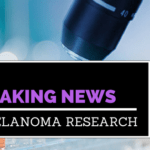Early Clinical Trial Shows Drug Activity to Work in Patients with Acral and Mucosal Melanoma

Results of a Phase 1/2 clinical trial showed promising data for patients with advanced acral and mucosal melanoma. The results were presented at the annual meeting of the American Society of Clinical Oncology in Chicago by a group of researchers from the Peking University Cancer Hospital & Institute in Beijing, China.
Clinical Trial participants were intravenously administered the agent IBI363, a fusion protein and bispecific antibody targeting PD-1 and IL-2Rα. This agent binds to the PD-1 checkpoint protein and simultaneously activates IL-2 on T-cells. These receptor proteins are on the outside of T-cell immune cells. The binding reactivates the immune system to fight the tumor.
The study enrolled 91 participants with either acral (n=47) or mucosal (n=44) melanoma who had received prior treatment with immunotherapy. At least half of the patients had two lines of prior treatment. The majority of the patients (89%) had Stage IV melanoma, and the others were split between Stage II and Stage III.
One patient with acral melanoma treated with IBI363 showed a complete response to therapy, and 22 patients had partial responses. Thirty-three patients had stable disease after treatment.
The 12-month overall survival rate was reported for treated patients with acral (51.1%), mucosal (68.4%), or both types (61.5%). Participants in the study experienced treatment-related adverse events that were consistent with those expected from immune checkpoint inhibitors.
The median progression-free survival rate was ~5.7 months for all groups. Without treatment, progression-free survival in patients with immunotherapy-resistant Stage IV acral or mucosal melanoma averages three months.
Researchers suggested that the agent was able to overcome the resistance to immunotherapy that the group of patients had developed. Further studies will be needed to confirm these results in a larger cohort with placebo controls.
Jun Guo from Peking University Cancer Hospital & Institute presented the data at the annual meeting of the American Society of Clinical Oncology in Chicago. It is also in abstract 2502, “Efficacy and safety results of a first-in-class
PD-1/IL2α-bias bispecific antibody fusion protein IBI363 in patients (pts) with immunotherapy-treated, advanced acral and mucosal melanoma.”
Recent Posts

Moderna, Merck’s Skin Cancer Vaccine Shows Sustained Benefit in Five-Year Follow-Up

Reflecting on Melanoma Treatment in 2025 and Looking to the Future in 2026

The Integrative Care Approach

Improved Response to Immunotherapy with COVID-19 mRNA Vaccines


